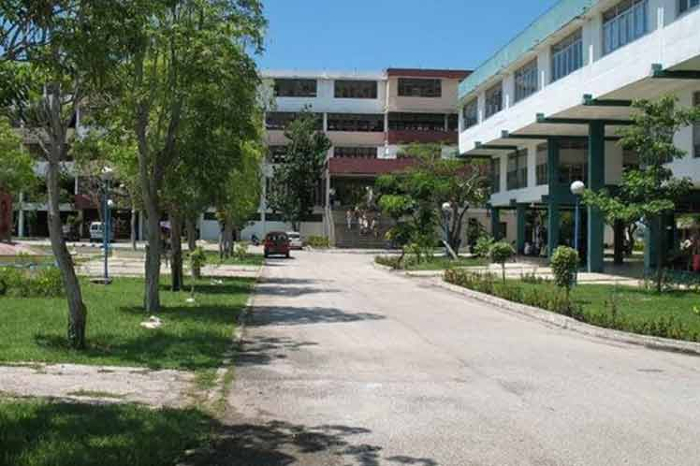![]()
Among the results is the international accreditation of the doctoral programs in Educational Sciences, in Chemical Engineering and the master’s degree in Applied Informatics with the Postgraduate Quality Award in Ibero-America granted by the Ibero-American Postgraduate University Association (AUIP)

Camagüey, Cuba, Oct 8th.- More than 190 collaboration agreements are maintained by the University of Camagüey Ignacio Agramonte Loynaz with institutions from 27 countries as part of an internationalization process that responds to the nation’s strategic axes and sectors.
Yailé Caballero Mota, director of International Relations of the house of higher studies, informed the Cuban News Agency that these links allow financing to promote projects related to the production of food and bioactive plant compounds, information technologies and communications, economic sciences, tourism and renewable energies.
Among the most important, she highlighted those related to the improvement of cow’s milk production potential through the introduction of a health management program in dairy herds of Camagüey in the central-eastern region of Cuba, eco-friendly multidisciplinary approaches to control and manage the Marabú in the central-eastern region of the country, and the improvement of shrimp farming through transgenerational stimulation.
The member of the World Academy of Sciences also stated that the Food Sovereignty and Nutritional Education Program is being developed with Belgium, as well as the lines of Agroindustry, Information and Communications Technologies, Biotechnology and Economic Development through programs and projects of the Consortium of Flemish Universities of Belgium (VLIR).
In the tourism sector, she noted, there are solid relations with Spain, specifically with the Balearic Islands, the University of Malaga and the University of Cádiz, while for the Management of Sustainable Local and Economic Development, projects financed by the European Union, the Agency French Development Agency (AFD) and the International Fund for Agricultural Development (IFAD).
For more than 30 years, she commented, the University of Camagüey has continuously strengthened working alliances with the Benemérita Universidad Autónoma de Puebla, in Mexico, through exchanges between students and professors of Architecture, as well as postgraduate training in the area of Pedagogical Sciences.
Agreements have been signed with more than 50 institutions of the Aztec nation, among which she recently mentioned the renewal of one that provides for the extension and consolidation of relationships in the field of Computer Science, Chemical Engineering, Agricultural Sciences and Physical Culture.
She also highlighted the links with the Dominican Republic, where eight institutions and the Ministry of Science, Technology and Higher Education have promoted joint projects and research in the Educational Sciences, while the University of Camagüey has provided academic services inside and outside border.
Annually, she stated, research stays are carried out through scholarships abroad in support of strategic sectors such as telecommunications and information technologies, food production and the pharmaceutical, biotechnology and biomedical production industries that contribute to the training of master’s degrees, doctorates and postdoctorates.
Another significant result, she assured, has been the international accreditation of the doctoral programs in Educational Sciences, in Chemical Engineering and the master’s degree in Applied Informatics with the Postgraduate Quality Award in Ibero-America awarded by the Ibero-American University Association of Postgraduate (AUIP).
Caballero Mota recognized the opportunities that the International Fair dedicated to two guest countries provides each year, with the aim of promoting intercultural exchange through experiences of foreign specialists, dances, exhibitions, preparation of typical dishes, among other proposals.
In recent calendars, she pointed out that attention to undergraduate and graduate students from Mexico, Spain, Colombia, the United States, Turkey, Italy and Panama has been perfected and consolidated with successful examples of incoming and outgoing mobility.
For the future, the main work projections will be aimed at strengthening cooperation with first world countries, promoting the commercialization of products and services intended for the foreign public, positioning the University in international rankings according to its scientific potential, and increasing the number of foreign undergraduate and graduate students in Cuba linked to government, ministerial and inter-university agreements.
(ACN)